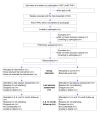Referral from primary care to a physical activity programme: establishing long-term adherence? A randomized controlled trial. Rationale and study design
- PMID: 19161605
- PMCID: PMC2654559
- DOI: 10.1186/1471-2458-9-31
Referral from primary care to a physical activity programme: establishing long-term adherence? A randomized controlled trial. Rationale and study design
Abstract
Background: Declining physical activity is associated with a rising burden of global disease. There is little evidence about effective ways to increase adherence to physical activity. Therefore, interventions are needed that produce sustained increases in adherence to physical activity and are cost-effective. The purpose is to assess the effectiveness of a primary care physical activity intervention in increasing adherence to physical activity in the general population seen in primary care.
Method and design: Randomized controlled trial with systematic random sampling. A total of 424 subjects of both sexes will participate; all will be over the age of 18 with a low level of physical activity (according to the International Physical Activity Questionnaire, IPAQ), self-employed and from 9 Primary Healthcare Centres (PHC). They will volunteer to participate in a physical activity programme during 3 months (24 sessions; 2 sessions a week, 60 minutes per session).Participants from each PHC will be randomly allocated to an intervention (IG) and control group (CG). The following parameters will be assessed pre and post intervention in both groups: (1) health-related quality of life (SF-12), (2) physical activity stage of change (Prochaska's stages of change), (3) level of physical activity (IPAQ-short version), (4) change in perception of health (vignettes from the Cooperative World Organization of National Colleges, Academies, and Academic Associations of Family Physicians, COOP/WONCA), (5) level of social support for the physical activity practice (Social Support for Physical Activity Scale, SSPAS), and (6) control based on analysis (HDL, LDL and glycated haemoglobin). Participants' frequency of visits to the PHC will be registered over the six months before and after the programme. There will be a follow up in a face to face interview three, six and twelve months after the programme, with the reduced version of IPAQ, SF-12, SSPAS, and Prochaska's stages.
Discussion: The pilot study showed the effectiveness of an enhanced low-cost, evidence-based intervention in increased physical activity and improved social support. If successful in demonstrating long-term improvements, this randomised controlled trial will be the first sustainable physical activity intervention based in primary care in our country to demonstrate long-term adherence to physical activity.
Trial registration: A service of the U.S. National Institutes of Health. Developed by the National Library of Medicine. ClinicalTrials.gov ID: NCT00714831.
Figures
References
-
- Giné-Garriga M. Guia d'Activitat Física en els Centres d'Atenció Primària. Barcelona: Institut Català de la Salut, Àmbit Atenció Primària; 2006.
Publication types
MeSH terms
Associated data
LinkOut - more resources
Full Text Sources
Medical


